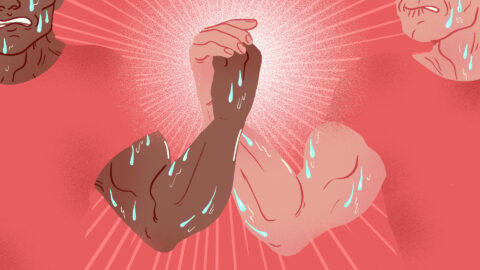For almost two decades, Chris DeWolfe and Aber Whitcomb — the minds behind social network platform Myspace and gaming company Jam City — have made it their mission […]
PS5 Is Losing A Major Feature: Twitter Integration

PlayStation 5 is ditching its integration with Twitter, the social media platform recently rebranded as “X” after Elon Musk bought it for $44 billion and then promptly crashed it into a brick wall like a dad coming home from a mid-life crisis bender in his brand-new Ferrari. Nintendo Switch will soon be the only…

Appetite wants to help you and your friends discover, plan and book a meal out
Appetite, an app for discovering and booking restaurants, is aiming to streamline the process of planning nights out with friends and family. After beta testing the app with […]
‘The Curse’ review: Emma Stone, Nathan Fielder, and Benny Safdie are here to break your brains
“The Curse” stars Emma Stone and Nathan Fielder as a couple with an upcoming HGTV show, and Benny Safdie plays their producer.

From the bizarre business schemes of Nathan for You to the mind-melting experiments of The Rehearsal, Nathan Fielder has always had a knack for interrogating the “reality” behind reality television. Now, he teams up with Benny Safide — co-director of nail-biting films like Uncut Gems and Good Time — to continue breaking our brains with the new scripted series, The Curse.
Starring Emma Stone, Fielder, and Safdie, and produced by A24 and Showtime, The Curse defies easy categorization. It’s the perfect storm of wince-worthy comedy, HGTV spoof, and surreal (and possibly supernatural?) drama, with plenty of commentary on everything from race to social media thrown in for good measure. As tough as it can be to watch at times — I dare you to go five minutes without cringing — there’s no doubt that The Curse is one of the funniest, strangest, and most unsettling shows of the year.
What is The Curse about?

Credit: Richard Foreman Jr. / A24 / Paramount+ with Showtime
Stone and Fielder play Whitney and Asher Siegel, a married couple at the center of an upcoming HGTV show awkwardly titled Flipanthropy. (Say it three times fast.) Their goal is to build eco-friendly homes in the city of Española, New Mexico, and “revitalize” the community by bringing in upscale coffee chains and jeans stores. It’s textbook gentrification, but Whitney and Asher want to distance themselves from that label. In Whitney’s perfect world, these new businesses will only employ locals, everyone will buy her passive homes, and she and Asher can subsidize any higher rent Española’s current residents may face. “Everybody’s a winner,” Asher tells a local reporter (Tessa Mentus) when she brings up the dreaded “G word.”
Of course, Asher’s blithe statement couldn’t be farther from the truth. The new businesses are more a front for Flipanthropy than they are new staples in Española, and Whitney’s plan to subsidize rent is just a Band-Aid lazily slapped on America’s much bigger issues. Then there are the passive homes themselves, with their garish mirrored facades that Whitney proudly says, “reflect the community.” If anything, the constant reflection is more of a visual nuisance for Asher and Whitney’s neighbors. It doesn’t help that the deceptive mirrors lead to the deaths of birds who fly smack dab into the walls. When bird corpses are a common occurrence around your house, maybe it’s time to rethink whether it’s as environmentally friendly as you claim it is.
Capturing Whitney and Asher’s so-called service work on camera is their producer Dougie Schechter (Safdie). He’ll try anything to make the show as entertaining as possible, no matter the ethics. Take the very first scene, which sees him pouring water on a woman’s face to create the illusion of a tearful response. It’s just one of many exploitative tricks he’ll use on his subjects in order to shape a new reality for the camera. Whitney and Asher are initially put off by these methods, unable to see that they, too, are exploiting the residents of Española.
One of Dougie’s filming plans leads us to The Curse‘s titular malediction. When he sees a young girl named Nala (Dahabo Ahmed) selling sodas in a parking lot, Dougie tells Asher to give her some money, thinking it’ll make good B-roll for the show. Asher hands her the only cash he has on him — a $100 bill — and immediately tries to take it back once they’ve stopped filming. Nala, understandably upset by this turn of events, proceeds to fix her gaze on Asher and deliver three fateful words: “I curse you.”
From there on out, things are… off with Asher, Whitney, and the production. There’s conflict with potential home buyers, complications with Asher and Whitney’s plans to conceive, and even discord in their marriage. Are all these bumps in the road Nala and the curse’s doing? Or were these problems always there, and did Asher and Whitney only start to notice them with the threat of a curse hanging over their heads? (Notably, the two also argue about whether it’s racist to assume Nala is even capable of cursing them.)
The Curse skewers reality TV with surreal stylings and a tinge of horror.

Credit: Richard Foreman Jr. / A24 / Paramount+ with Showtime
The Curse plays with just how real Nala’s curse is over the course of its 10 episodes. Strange events on the set of Flipanthropy are commonplace, yet they could just as easily be attributed to human error as to magic. However, The Curse doesn’t rule out the supernatural outright. Horror-adjacent imagery appears throughout, from the dead birds to long shots tracking characters’ movements that would be right at home in a slasher. Discussions of troubled pregnancy invoke the subgenre of motherhood horror, and composer John Medeski (working with music producer and frequent Safdie collaborator Daniel Lopatin) crafts a soundscape that wrings unease out of even the most mundane moments.
The ambiguity of the curse plays into the show’s larger fascination with how we engineer and interact with false narratives. Reality TV serves as the prime source of artifice here, with Asher and especially Whitney crafting how their marriage and their work comes across onscreen. If enough people believe the fantasy they’re being sold, does that make it true? And if you spend your relationship living for the camera, how can you tell what’s real or not?
To further hammer home these ideas of warped reality, The Curse makes liberal use of mirror shots and distorted mirror imagery. It pairs these with shots of conversations framed in windows or doorways, or filmed from a great distance, lending the show a voyeuristic quality. What are we truly meant to be seeing?
The Curse‘s main characters will make you cringe and laugh (but mostly cringe).

Credit: Richard Foreman Jr. / A24 / Paramount+ with Showtime
The Curse‘s preoccupation with artifice manifests itself most in Whitney. She cares so much about her self-image that she forces Asher to recreate their cutest moments beat-for-beat for her Instagram followers. Her activism is a facade as well — although she may not be self-aware enough to realize that. She fervently claims to support Española’s residents, including the Pueblo people of New Mexico. However, she frequently uses and tokenizes the Native Americans she meets, like her artist friend Cara Durand (Nizhonniya Luxi Austin). In a show full of moments that make you want to crawl out of your skin, Whitney’s interactions with Cara are among the most horrifying.
Asher is no stranger to fantasy either, with The Curse relishing unpicking his self-imposed ideas of masculinity. Between jokes about penis size and being called Whitney’s “jester” instead of her “king,” Asher goes through the humiliation gauntlet with a brave face that is always seconds from slipping. Then there’s Dougie, whose sleazy producer persona masks a deeper sadness and some wildly unhealthy coping mechanisms.
With these three characters and their conflicting senses of self firmly in place, The Curse simmers with an at-times unbearable awkwardness. Will you feel a combination of embarrassment and disgust toward Whitney, Asher, and Dougie’s actions? Yes. Will you occasionally recognize yourself in them? Horrifyingly, also yes. When broader moments of comedy arise — like the aforementioned penis jokes — they come as a welcome, tension-breaking relief. Yet The Curse refuses to let you get comfortable for long. Often, these laugh-out-loud jokes will resurface down the line in an even more squirm-worthy scene, as if The Curse is wielding your own prior comfort against you.
Emma Stone, Nathan Fielder, and Benny Safdie make for an excellent trio in The Curse.

Credit: Richard Foreman Jr. / A24 / Paramount+ with Showtime
The Curse wouldn’t work half as well as it does without the total commitment of Stone, Fielder, and Safdie, who make for an unlikely (but well-matched) supergroup. Stone has already proven her comedic chops ten times over with films like Easy A and The Favourite, but The Curse may be her funniest turn yet. Whitney’s eco-influencer jargon is gold in Stone’s hands, but she blends it with a discomfiting sense of artificiality completely in sync with the tone Fielder and Safdie have created. It’s pitch-perfect work, and when paired with the release of Poor Things, it helps mark a banner year for Stone.
In a departure from shows like Nathan for You and The Rehearsal, Fielder is not playing a version of himself but rather an entirely new character. Still, you’ll recognize elements of his prior performances in Asher’s awkward deadpan. He’s a total punching bag for the show, with Flipanthropy focus groups wondering why Whitney would even marry him. That disbelief makes it all the funnier — and uncomfortable, naturally — when Asher inevitably loses his cool. Prepare yourself for some angry, desperate rants from Fielder that will leave you speechless, and some especially inspired physical comedy in later episodes.
As Dougie, Safdie is slippery and scummy, the ideal contrast to Whitney’s earnest(ish) idealism. While shooting Flipanthropy, he reads as a dirtbag Machiavellian schemer looking to get the perfect shot — even at the expense of people like Asher. But in his personal life, he’s a flailing mess. Here, Safdie must shoulder some of The Curse‘s most painful revelations, resulting in tragi-comic scenes like a first date gone off the rails.
These three off-the-wall performances combine with The Curse‘s ambitious genre-bending to make for one of 2023’s most original TV series yet. It’s densely layered with bizarro comedy, bold set pieces, and pertinent social criticism. Yes, Asher, Whitney, and Dougie’s convictions may be hollow, but The Curse is filled to the brim with things to say — and some absolutely wild ways to say them.
Stream like a pro with this $60 Windows tool
Save 70% on a lifetime subscription to XSplit Broadcaster Premium at the Mashable Shop.

TL;DR: Through Nov. 9, you can sign up for a lifetime subscription to XSplit Broadcaster — a streaming and screen-recording tool that helps you create engaging content — for just $59.99 instead of $200. That’s 70% in savings.
If you’ve been thinking of starting a gaming channel on Twitch or a video podcast but don’t have the equipment to get started, think again: XSplit Broadcaster is a streaming tool and screen recorder that turns your PC into a full video mixing board.
This Windows application retails for $200, but, as we countdown to Black Friday, a lifetime subscription is on sale for $59.99 through November 9.
Stream your content your way
XSplit is completely customizable to your content needs. Those who want to livestream games can show their gaming scene and interpolate their webcam onto the screen. You can even add Zoom or Discord calls if you’re playing with fellow streamers.
Here’s a look at what other tools you’ll have at your fingertips:
-
Add and resize videos, images, GIFs, and web pages.
-
Change the shape of any camera or media.
-
Build custom transitions or loops for a “BRB” screen and sponsored messages.
-
Adjust audio levels for individual scenes.
-
Reduce background noise.
Manage everything from a single monitor with a digital panel that doesn’t make you leave your game. You may also use multiple displays with projector mode.
Stream it live or record it for later
XSplit works with top broadcast platforms, has built-in plugins, and supports the option for custom RTMP to stream to other platforms like social media. You also have the option to record content instead of streaming it live.
Whether you want to create YouTube podcasts, stream games, or create a video presentation for school or work, XSplit packs in tools that make it simple.
Take advantage of this limited-time price drop and get a lifetime subscription to XSplit Broadcaster for $59.99 (reg. $200) until November 9 at 11:59 p.m. PT, with no coupon needed.
Prices subject to change.

Opens in a new window
What is No Nut November? Why abstaining from masturbation isn’t healthy.
What is ‘No Nut November’? The practice of abstaining from masturbating for one month is harmful and the online community surrounding it spread misinformation about sex, and posts that are racist, antisemitic, and misogynistic.

“I got a massive W [win] recently because I managed to refuse sex during a wet dream,” 26-year-old Aaron tells Mashable. “So I’m the No Nut November king, heavy are the balls that wear the crown.”
Akin to monthly events centred on health-based challenges like Sober October or Movember, No Nut November is where people resist partnered sex and masturbation, with the aim of not ejaculating for 30 days. The challenge has developed into something of an online community, with hundreds of Discord servers and online forums acting as digital pseudo support groups for those taking part, and the No Nut November Reddit community totalling 137,000 members, called “nut comrades.”
While some are there to share memes and have a laugh, others are there to take the challenge very seriously, believing it will better them in some way. And some members have darker intentions.
Aaron, who works in digital advertising, says he partakes in No Nut November annually, and has done since 2017. He’s an avid Reddit user, which is where he came across the movement, and was led to believe it would come with an array of health benefits. “Better mental health,” “improved will power,” and “being better in bed” are just a few reasons he cites for signing up to the challenge.
“Frequent ejaculation is good for prostate health and masturbation is a healthy behaviour.”
The No Nut November community centres ideas like these. It has even been suggested by people in support of the challenge that abstinence can increase testosterone. But experts and actual research have presented data that suggests the complete opposite of this.
Sexologist and author of Sexology: The Basics Silva Neves tells Mashable that there are “literally no benefits to giving up masturbation for a month, or even a week. None. Frequent ejaculation is good for prostate health and masturbation is a healthy behaviour.”
In fact, masturbation is often used by many for stress relief and tension, and for better sleep. Neves explains stopping masturbation can increase people’s stress and people can have less good quality sleep, which can impact on their work, their relationships, and their overall well-being.
Sex educator and author of All the F*cking Mistakes Gigi Engle adds that giving up masturbation will also likely make you sexually frustrated. “It will make you more irritable if you’re not getting that release. If you stop masturbating, it can also make you more anxious. You don’t need to masturbate for a month if you don’t want to, but there’s no real pros to giving it up,” she explains.
Want more sex and dating stories in your inbox? Sign up for Mashable’s new weekly After Dark newsletter.
“Turning down sex and giving up wanking is a big thing for a man,” Aaron adds. “There’s just something about resisting it for an entire month and having your boys big you up that feels like a good accomplishment. I need to know I’m able to do it, so I know I’m not addicted.”
There’s an ongoing narrative in the No Nut November movement that these side effects of a lack of masturbation are a “symptom” that men are “hooked” on sexual pleasure. This feeds into the myth of sex addiction, which is not actually recognised by science.
“It does not make you a failure to masturbate. The idea that it does comes from purity culture where masturbation is considered about as ‘dirty’ and ‘sinful.'”
Neves adds that many members of the community will use this misconception as a reason why men should try harder to stop. “But those symptoms are an indication that they become dysregulated because they have lost one central and healthy and harmless way to manage their stress.”
The movement is also underpinned by ideas of “winning” and “losing”. A quick scroll through the No Nut Subreddit reveals disturbing posts of misogyny and intense, public group shaming towards those who share their “failures”. One Reddit user shared that he got an erection over Amy Schumer which received thousands of downvotes (the dislikes of Reddit) and shame-fuelled comments like “man down” and sexist replies like “come on, if you’re going to break NNN, do it for someone hotter than that.”
Engle explains that this language focused on showing your power and “winning” is rooted in misogynistic purity culture. “It does not make you a failure to masturbate. The idea that it does comes from purity culture where masturbation is considered about as ‘dirty’ and ‘sinful’ and that taking part in it makes you weak or perverted. None of this has any scientific basis or evidence.”
Neves says that associating masturbation with failure can have a severe impact on the person’s mental health. “It can be detrimental to people’s psychological well-being,” he explains. “Having the goal of restraining masturbation for one month as a ‘win’ can increase shame, stress, anxiety, a sense of failure, impacting on self-esteem and they often feel ‘not man enough’ or even ‘broken’ if they don’t succeed. Those who do succeed put themselves on a pedestal looking down on those who don’t.”
Basically, the whole movement is pretty shame-drenched, and at times, just plain cruel. A better challenge, Neves suggests, would be trying not to judge other people’s sex lives for one month.
Unfortunately, sexual health misinformation and toxic masculinity displays are not the only problems with the movement. What began as an online challenge for a bit of fun or an opportunity to shitpost online at best, has been co-opted by the far-right. Racism, misogyny and anti-semitism runs rife on the No Nut November subreddit and other #NNN discussions on social media platforms like Twitter.
A deeper message propelling No Nut November is an anti-porn and anti-sex worker agenda. Most [cisgender] men use visual aids for sexual stimulation. So, for many, abstaining from masturbation means refraining from pornography use. And rather than take this into their own hands, many in the community have harassed sex workers online, projecting blame.
“Some of those No Nut November forums have been found to be misogynistic, homophobic and antisemitic,” Neves adds. “They incite violence towards pornographers and women who are sexual. There is a nasty underbelly to these movements.”
Back in 2018, for example, porn company xHamster tweeted against No Nut November, albeit playfully, implying that the movement shared misinformation and that porn wasn’t the bad guy. The fallout from this pretty innocent tweet, were violent anti-sex worker replies like “capital punishment for pornographers now” and anti-semitic images suggesting that Jewish people control pornography. Similar messages of sexism and anti semitism remain four years later, both on the #NoNutNovember hashtag on twitter, and in Reddit spaces.
29-year-old copywriter Sanjai tells Mashable he took part in No Nut November four years ago after hearing some of his favourite podcasts talk about how freeing it was for them. “They talked about it like it was a fitness challenge which is something I’ve always loved doing and liked the feeling of accomplishing. I didn’t really wank that much anyway, not compared to my mates anyway, so I thought ‘why not?'”
Sanjai did come across anonymous forums for the challenge like the Subreddit along with a couple of Ddiscord servers. “I wasn’t there long. It was fucking disturbing to be honest. These men are really weird,” he shares.
“[I saw] sexism, racism, conspiracies. You name it. I just wanted to see how long I could go without wanking, man,” he laughs.
Aaron says he’s aware of this part of the No Nut November community, but doesn’t get involved. “I don’t know anyone personally, that’s part of all of that stuff. It’s nothing to do with abstinence anyway so I don’t know why it’s there but I guess racists will use whatever [they can].”
Neves says a lot of people have received misinformation about masturbation, often accompanied by misinformation about watching porn, and they feel shame about their masturbation behaviours. This is likely what initially attracts so many men to take part in the movement, along with the element of community and support that’s visible from the outside. But when they get there, they’re introduced to alt-right propaganda, misinformation, and violence instead.
Being exposed to shameful language around sex is also no small enemy. Engle points out that engaging in sex negativity can make people feel like they can’t talk about sex (which creates problems around consent and managing sexual boundaries), make them avoidant in sexual exchanges because they’re worried about their performance (a common cause of erectile dysfunction) and encourage misogynistic ideas.
If you’ve participated in No Nut November this month or you’ve caught wind of it and were thinking about it for next year, consider that you’re likely to interact with intense shame, sex negativity, discriminatory behaviour and inaccurate sexual health information. You certainly won’t learn anything about who you are as a man, person, or lover of any kind. Close your Reddit tab and have a wank instead.
This story was first published in 2022 and republished in 2023.
Overwatch 2’s Latest Patch Is Nerfing The Support Heroes

Overwatch 2’s latest balance patch ahead of the upcoming Le Sserafim collaboration event is hitting Support heroes hard. Blizzard said this was its plan in a developer update earlier this month, but looking at the actual patch notes, it definitely looks like medics are feeling the latest nerfs most.

Twitch’s AI Seinfeld Show Has Devolved Into Existential Horror

Twitch’s first big artificially generated show Nothing, Forever is not the same anymore. Although it’s been running nonstop since December 2022, with just a handful of changes here and there, the Seinfeld-like broadcast almost broke late last week. Now, after getting fixed, it’s somehow even creepier than before.

FPS Crushing Steam Charts Already Ruined By Cheaters, AI

The Finals is a forthcoming free-to-play first-person shooter from new studio Embark, set in a fictional game show’s death arena. Its open beta—which you can sign up for now through November 5 on Steam, PS5, or Xbox Series X/S—promises confetti colors and similarly striking flames and explosions. It looks exciting,…

Discord is growing its developer monetization efforts
In a time when X (formerly Twitter) and Reddit have sequestered API access behind steep paywalls, Discord is taking the opposite approach. A few weeks ago, Discord enabled […]









